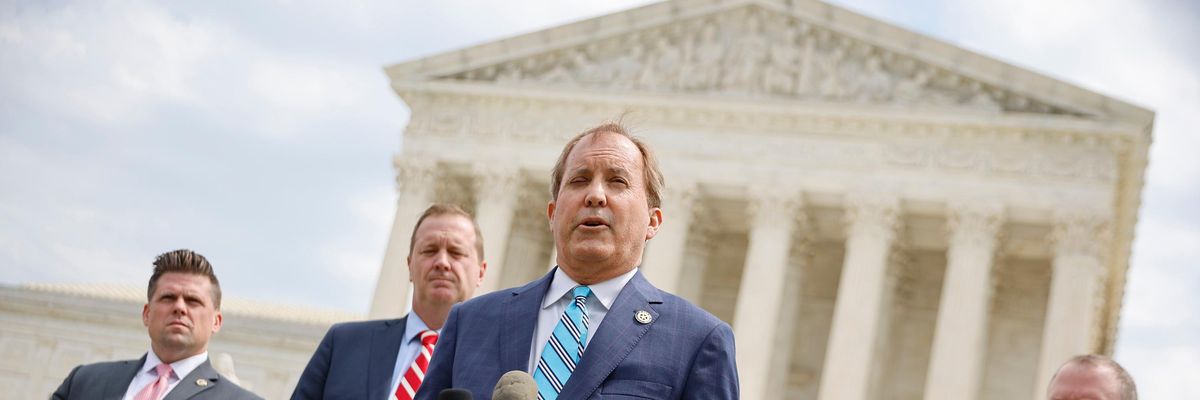Republican attorneys general and corporate advocacy groups are exploring ways to sue the Biden administration over its newly announced plan to cancel $10,000 in federal student loan debt for most borrowers, hoping the conservative-packed U.S. judiciary will strike down the executive action and deny badly needed relief to around 40 million people.
"Conservative jurists, and ultimately the justices themselves, will be eager to shred the new program."
Shortly after President Joe Biden announced his debt forgiveness plan, the Job Creators Network--a dark money organization representing business groups and executives--declared that it is "weighing its legal options to block President Biden's illegal student loan bailout," calling the move "executive overreach."
Americans for Prosperity, an organization founded by billionaire Charles Koch and his late brother David, also expressed outrage at the Biden administration's plan, wailing that "this shameless handout will only push education costs even higher, cause people to take out even bigger loans, and set a dangerous precedent that the government will just come along and erase their debt in the future."
The key question vexing right-wing groups and officials, though, is whether any party actually has standing to sue over the debt relief plan, the product of years of sustained grassroots activism.
A widely cited Virginia Law Reviewarticle published in April argues that essentially no one--not taxpayers, not former borrowers, not state governments, not loan servicers, and not Congress--has standing under current law and legal precedent to challenge student debt cancellation in court.
Ken Paxton, the Republican attorney general of Texas and one of several GOP officials seeking ways to tank the debt relief plan, acknowledged the standing obstacle in an appearance on the right-wing channel Newsmax.
"I don't think this is constitutional," said Paxton. "We have to find a way in the state of Texas to find standing, or we need individuals to sue that have damages as a result of this. Because that, I think, is going to be the most effective way of getting at what I view as clearly something the president can't authorize."
Echoing Paxton, Missouri Attorney General Eric Schmitt toldFox News Digital that he is "actively looking into legal options to halt the Biden administration's abuse of power."
The White House decided to base its legal case for sweeping student debt relief on the 2003 Higher Education Relief Opportunities for Students (HEROES) Act, which gives the education secretary the authority to waive laws related to student aid programs in the case of "a war or other military operation or national emergency," such as a global pandemic.
In a memo released last week, the Justice Department states that the HEROES Act "grants the secretary of education authority to reduce or eliminate the obligation to repay the principal balance of federal student loan debt, including on a class-wide basis in response to the Covid-19 pandemic, provided all other requirements of the statute are satisfied."
Right-wing groups, GOP attorneys general, and centrist think tanks such as Third Way have claimed the administration's legal justification is faulty, but Slate's Mark Joseph Stern argues that "Congress intended the HEROES Act to apply swiftly and widely."
"The Trump and Biden administrations both used this law to freeze student loan payments during the pandemic," Stern noted Thursday. "Going by the plain language of the law alone, Biden's plan is likely legal."
However, Stern cautioned that "certain key circuit courts and the Supreme Court seem to follow one standing rule: When a majority wants to decide a case on the merits, they find some justification to grant standing; when it doesn't, they don't."
The so-called "major questions doctrine" is also a potential sticking point.
"The Biden administration should proceed on the assumption that the conservative jurists, and ultimately the justices themselves, will be eager to shred the new program, and will therefore find that somebody, somewhere has standing," he wrote. "It should also consider its response when a Trump judge inevitably issues a nationwide injunction against debt cancellation and the Supreme Court's conservatives uphold it. There are several paths to student debt relief, and even this partisan judiciary cannot block them all."
One such path, Stern suggests, is for the Biden administration to announce "that any borrower affected by the pandemic can apply for relief" if the Supreme Court rules that the education secretary "must identify a more specific class of borrowers whose ability to pay off loans was demonstrably harmed by the pandemic."

